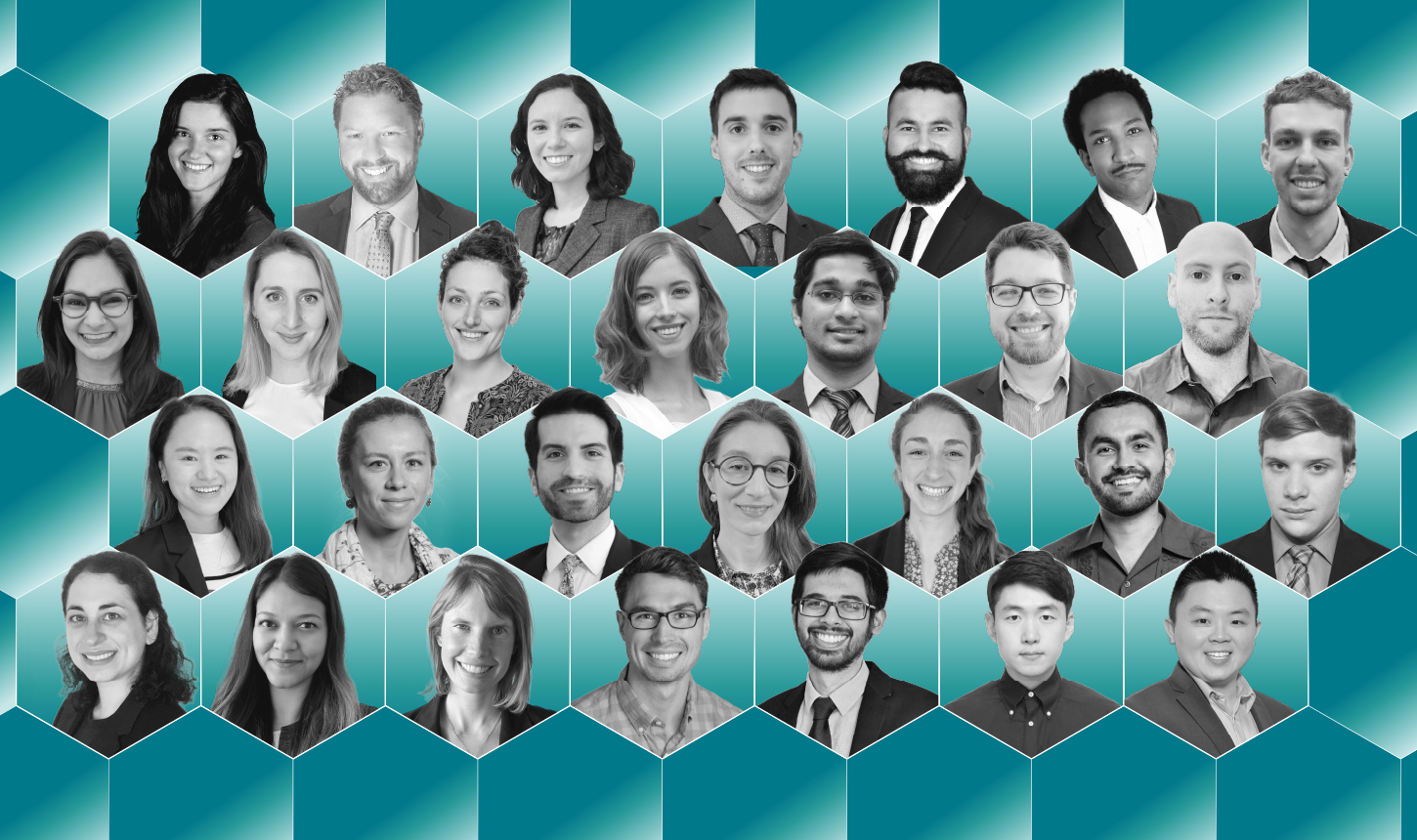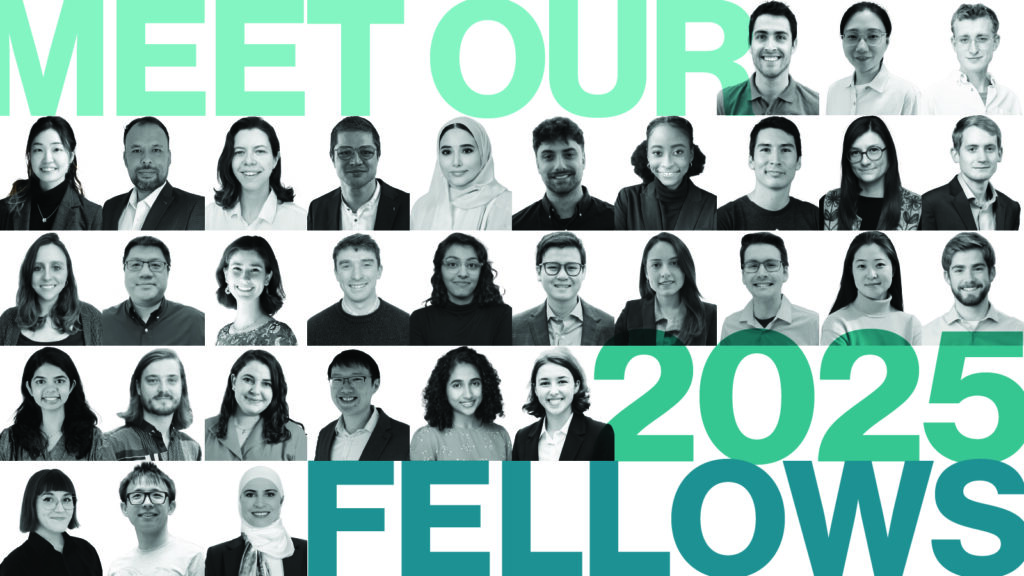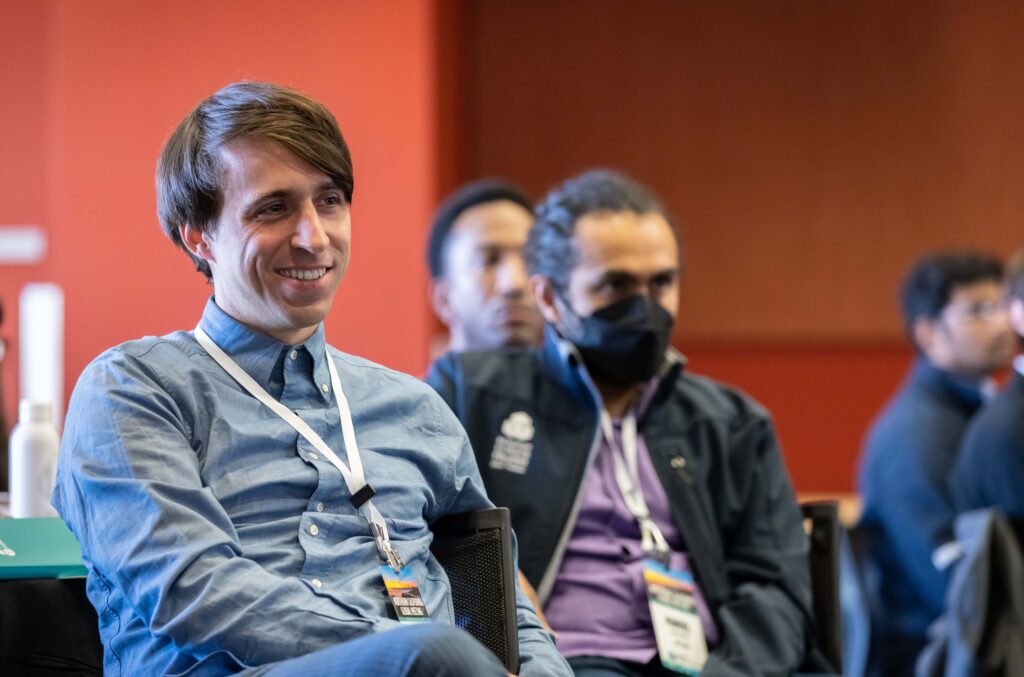Gergana Daskalova, University of Edinburgh
Gergana has been studying the individual and cumulative impact of human activities on global biodiversity, exploiting the recent revolution in the availability of ecological data. As a Schmidt Science Fellow, she now plans to integrate remote sensing, data science, and human demography to explore the impact of abandoned land on diversity and conservation efforts. As the world’s population increasingly migrates to cities, more land is being abandoned, but we currently do not know if this is a threat or an opportunity for nature.
Austin Evans, Northwestern University
Austin plans to pivot from chemistry to physics as a Schmidt Science Fellow. He has already developed new methods to prepare macromolecular sheets – which have a regular structure, atomic-scale thickness, and immense porosity – and successfully use them in devices. Now, Austin plans to develop highly precise unconventional new materials that can be used to control light-matter interactions. This work could underpin the coming revolution in quantum technology that will change computing, communications, energy systems, and more.
Vivian Feig, Stanford University
Vivian spent her PhD developing conductive hydrogels that can effectively interface with the body’s cells and offer the opportunity to realize the potential of electronics in medicine. Her work could be used in many applications from advanced prosthetics to regenerative medicine. As a Fellow, Vivian plans to harness the process of liquid metal embrittlement, where high-strength solid metals can be induced to weaken on contact with certain liquid metals, within diverse biomedical applications.
Álvaro Fernández Galiana, Massachusetts Institute of Technology
Álvaro has been working on the international LIGO project, developing highly precise opto-mechanical instruments to support the project’s mission to detect elusive gravitational waves. He now aims to pivot into biological analysis to combine vibrational spectroscopy with machine learning to develop a low-cost, rapid, and field-deployable device for disease detection. By engineering an electronically based device that will not need reagent supplies, Álvaro hopes to improve detection and health outcomes in resource-constrained environments during future epidemics.
Shashank Gandhi, California Institute of Technology
Working with birds as a model species, Shashank uncovered the genetic network responsible for normal embryonic heart development. His work has the potential to lead to new treatments for congenital heart defects. As a Schmidt Science Fellow, Shashank will investigate cutting-edge human tissue culture techniques to identify novel cancer-causing mutations, enable efficient prioritization of drug targets, and personalize the testing of treatment options. He will give particular focus to colorectal cancer, which lacks effective treatments for late-stage patients and is the second leading cause of cancer deaths worldwide.
Trevor GrandPre, University of California, Berkeley
Trevor’s PhD focused on using modern statistical physics techniques to quantify fluctuations in systems systems that are far from equilibrium to understand processes such as diffusion and energy dissipation. He now plans to pivot into biophysics to study the growth dynamics of E. Coli. The bacteria grow robustly and predictably despite changes in their environment and available resources. Trevor aims to overcome current experimental challenges with machine learning approaches.
Max Hülsey, National University of Singapore
Max has been working on model single-atom catalysts to understand catalytic function better and to guide the design of improved catalysts for uses such as car exhausts and the conversion of biomass to renewable liquid fuels. Now he aims to combine thermo- and electrocatalysis for the carbon-neutral production of chemicals and fuels from greenhouse gases.
Fatima Aysha Hussain, Massachusetts Institute of Technology
Fatima’s PhD research focused on understanding the genetic dynamics involved in how viruses drive bacterial evolution in the wild. From environmental microbiology, she aims to pivot into human immunology to study the community of microbes in the vagina. The nature of this community can significantly impact a woman’s susceptibility to acquiring HIV, preterm birth, and bacterial vaginosis. Fatima plans to use insights from her research to design synthetic communities and test them in the lab for their potential to improve women’s health outcomes.
Geraldine Jowett, King’s College London
Geraldine’s PhD research has focused on a new population of white blood cells called innate lymphoid cells and revealed an unexpected role for these cells in intestinal cancer and fibrotic scar tissue formation. As a Fellow, she aims to find a way to study more effectively the physical forces that determine egg and sperm development and can inspire bioengineered gonad designs. Geraldine’s planned research could revolutionize fertility options by understanding the biophysics of sperm and egg development.
Sema Karakurt-Fischer, Technical University of Munich
Sema has been working to understand the role of treated wastewater in rivers and how this impacts downstream drinking water quality. She plans to pivot from engineering into biology to explore the potential for biodegradation of so-called ‘forever’ chemicals to provide sustainable clean drinking water. Extensive contamination of soils and freshwater sources with these chemicals has become one of the most serious environmental and health concerns worldwide and Sema’s research aims to increase our understanding of the problem and potential nature-based solutions.
Anastasia Korolj, University of Toronto
Anastasia’s PhD research demonstrated how cells grown on 3D biomimetic surfaces developed better function and structure than cells on standard flat culture dishes and were more responsive in diagnostic applications. Her findings could be used to create effective technologies for regenerative medicine. Now she plans to study chaos in both engineered tissues and patient samples by applying chaos mathematics to personalized medicine to unlock early disease detection.
Suhas Mahesh, University of Oxford
Suhas’s PhD research harnessed a breakthrough semiconductor, hybrid perovskite, to develop next generation solar cells that produce 30% more energy with lower operating costs. He now aims to pivot into machine learning and materials science to exploit the enormous potential of this new class of materials. By applying machine learning techniques to billions of possible materials, Suhas aims to accelerate perovskite discovery and its application to clean energy technology such as photovoltaic cells and battery storage.
Sebastian Musslick, Princeton University
Sebastian used his PhD to investigate the fundamental and previously unknown reasons for humans’ inability to effectively multitask. He now aims to help the behavioral science community overcome the challenge of integrating large amounts of data into scientific theories by enhancing machine learning techniques into a closed-loop system for the generation, estimation, and validation of scientific models. Sebastian’s planned research has the potential to significantly accelerate scientific discovery.
Ofer Neufeld, Technion Israel Institute of Technology
Ofer has been developing theoretical approaches to understand the role of symmetry in strong field physics and high harmonic generation in order to explore how this could be harnessed to control the properties of matter, of extremely fast light-matter interactions light-matter interactions, and to develop novel spectroscopy techniques in atomic and molecular systems. As a Fellow, he plans to further our understanding light-matter interactions to understand the behavior of quantum materials and inform new light-based materials.
Mengyao Niu, University of Wisconsin-Madison
Mengyao’s PhD research has focused on the biological significance of a group of fatty acids called oxylipins and their metabolic pathways in fungi. She has revealed the role of oxylipins as molecular signals that direct the lifecycle transitions and metabolism in fungi and shape their interplay with human immune system. As a Schmidt Science Fellow, Mengyao aims to build computational and engineering approaches to understand signals of chronic lung diseases to create new methods, knowledge, and interventions to address this increasing problem for global society.
Sirma Orguc, Massachusetts Institute of Technology
Sirma has been developing wearable and implantable devices with medical and neuroscience applications, with a focus on overcoming challenges around efficiency and size. As a Schmidt Science Fellow, she plans to build a simplified model of complex brain activity with control systems to allow the study of neuroscience problems. Sirma hopes her work will enable innovative treatments for neuro disorders.
Jacob Paiano. University of Pennsylvania
Jacob’s PhD research examined fundamental cell biology questions around how the body’s cells purposely initiate, process, and repair DNA breaks during cell division, while avoiding catastrophic consequences. Now, he aims to pivot into systems biology to work with fruit flies to explore tissue communication networks and to develop a systems-level understanding of disease.
Elisabetta Perotti, Uppsala University
Elisabetta plans to use her Fellowship to pivot from physics into renewable energy. During her PhD she studied hadron physics and aimed to further our understanding of the fundamentals of the universe. She now plans to model and simulate an autonomous future electric grid, able to cope with the variability of renewable generation and changing consumer demand. Elisabetta hopes her work will contribute to the development of a next generation electric grid and the needed transition to clean energy.
Rebecca Pinals, University of California, Berkeley
Rebecca’s PhD research has helped to develop more robust sensors for uses such as monitoring dopamine in the brain. Her work investigated how nanoscale sensors interacted with the material they were designed to sense. Rebecca now plans to pivot into neuroscience to design molecular recognition tools for understanding and ultimately treating Alzheimer’s Disease.
Manuel Razo-Mejia, California Institute of Technology
Manuel has been studying the biophysics of single cells to investigate how single cell organisms with no nervous system can still use signals from their environments to make decisions. As a Schmidt Science Fellow, he will pivot into experimental evolution with the aim of tackling antibiotic resistance. Manuel will take an interdisciplinary approach to investigate experimental data on the evolution of antibiotic resistance in microorganisms with the ultimate aim of informing new treatments.
Kurt Ristroph, Princeton University
Kurt’s PhD research developed several new techniques for the use of nanocarriers for effective drug delivery into the body. He developed new nanoparticle formulation techniques that he now plans to apply to agricultural problems to improve global food security. Kurt aims to use trackable nanoparticles to study their interactions within the plant and the environment and then tune these for maximum impact to design approaches for increased yield or better disease resistance.
Sandra Schachat, Stanford University
Sandra’s PhD involved the study of prehistoric oxygen and carbon dioxide levels, fossils, and geology to answer fundamental questions about what drove early species out of the oceans and onto the land hundreds of millions of years ago. She plans to pivot into present day behavioral ecology to investigate what drives asexual reproduction in insects. Sandra’s work will help us understand how human-driven species extinction is impacting insect reproductive behavior and its consequences for biodiversity conservation.
Sapna Sinha, University of Oxford
Sapna has been studying graphene during her PhD and specifically working to overcome its limitations for use in electronics by integrating it into other systems. As a Schmidt Science Fellow, Sapna plans to combine nanoscience and neuroscience to develop new devices to image complex nerve systems during surgery. She hopes her work will help to protect millions of people from nerve injury during surgery, drastically improving patient outcomes.
Jenelle Wallace, Harvard University
Jenelle’s PhD explored how cells make connections in our brains to investigate the potential and the limits of the brain’s capacity to adapt and thus revealed new opportunities to treat brain injuries and disorders. She now plans to pivot into evolutionary biology to investigate changes in the genetic sequences of neurons, which may provide insights into both the evolutionary origins of humans and potential avenues for future treatment of neurodevelopmental disorders.
Jamison Watson, University of Illinois at Urbana-Champaign
Jamison’s PhD research utilized a technique that massively accelerates the natural process that creates oil to produce liquid fuel from waste such as manure, excrement, and agricultural waste. He now plans to use his Fellowship to develop a model biorefinery that can not only produce fuel from waste but also generate other valuable products from the process, such as hydrogen gas and drinking water. Jamison hopes that when proven and scaled-up that this approach can deliver clean fuel, energy, and economic benefits.
Bryan Wilder, Harvard University
Bryan’s research develops AI and machine learning approaches for public health applications, collaborating closely with frontline health workers to improve outcomes for diseases such as COVID-19, HIV and tuberculosis. He now plans to focus tools to support rapid responses to future epidemics. Bryan’s machine learning tools for epidemics aim to provide local-level predictions for both public health responses and to improve scientific knowledge of disease transmission.
Ji Mun Yoo, Seoul National University
Ji Mun’s PhD research has focused on the chemical engineering of improved electrocatalysts. As a Schmidt Science Fellow, he plans to pivot to work on sustainable and decentralized systems to provide clean water. Ji Mum aims to open new research avenues for electrochemical water purification and desalination that could provide access to clean water anywhere in the world.
Kevin Zhao, Harvard University
Kevin’s PhD research involved the development of new, highly precise gene editing technology. As a Schmidt Science Fellow, he now plans to work on the rapid generation and identification of new crop variants that will be better suited to cope with our changing climate. Kevin aims to develop a research pipeline that can identify variants with traits that will improve global food security.



